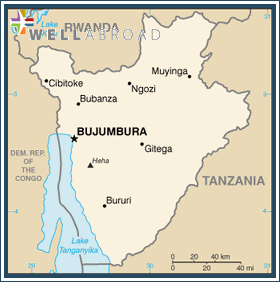|
MOST RECENT ALERTS
There's no recent alert.
|

|
|||||||||||||||
| COUNTRY OVERVIEW | ||||||||||||||||
|---|---|---|---|---|---|---|---|---|---|---|---|---|---|---|---|---|
|
| COUNTRY GENERAL INFORMATION | |||||||
|---|---|---|---|---|---|---|---|
| Language: |
Kirundi (official), French (official), Swahili (along Lake Tanganyika and in the Bujumbura area) |
||||||
| Currency: | Burundi Franc (BIF) | ||||||
| Predominant Religions: |
Christian 67% (Roman Catholic 62%, Protestant 5%), indigenous beliefs 23%, Muslim 10% |
||||||
| National Holidays: | Independence Day, 1 July (1962) | ||||||
| Economic Status: |
Burundi is a landlocked, resource-poor country with an underdeveloped manufacturing sector. The economy is predominantly agricultural with more than 90% of the population dependent on subsistence agriculture. |
||||||
| Security: |
National Defense Force (Forces de Defense Nationales, FDN): Army (includes Naval Detachment and Air Wing) |
||||||
| US Presence: |
U.S. Embassy Bujumbura |
||||||
| Document Requirements: |
A passport, visa and evidence of immunization against yellow fever are required for entry. Travelers with an expired visa are not permitted to leave the country without acquiring an exit visa prior to departure. The latest information about visas may be obtained from the Embassy of the Republic of Burundi, Suite 212, 2233 Wisconsin Avenue, NW, Washington, DC 20007, telephone (202) 342-2574, or from the Permanent Mission of Burundi to the United Nations in New York at telephone (212) 499-0001 thru 0006. Information about dual nationality or the prevention of international child abduction can be found on our web site. For further information about customs regulations, please read our Customs Information sheet. |
||||||
| Major Airports: |
Airports: 8, Airports w/paved runways: 1 Bujumbura Airport (BJM/HBBA) |
||||||
| Servicing Airlines: |
|
||||||
| Risks and Precautions: |
US Dept of State Travel Warning for Burundi, Updated 4 November 2010. The State Department warns US citizens of the risks of traveling to Burundi. This notice replaces the Travel Warning for Burundi, dated May 19, 2010, to provide information regarding travel to and within Burundi, as well as revised information on security restrictions for Embassy personnel. |
||||||
| Mortality Statistics: |
Infant MR total: 61.93 deaths/1,000 live births |
||||||
| Immunization Indicators: |
Required: None |
||||||
| Infectious Disease Concerns: |
Malaria is a risk for ALL of Burundi. |
||||||
| Overall Quality of Medical Services: |
Medical facilities are limited in Burundi. Medicines and prescription drugs are in short supply, if not completely unavailable. Sterility of equipment is questionable, and treatment is unreliable. |
||||||
| Providers in Network: |
|
||||||
| Recent Medical Threats/ Concerns/Warnings: |
African sleeping sickness (African trypanosomiasis), which is transmitted through the bite of an infected tsetse fly, can be found in distinct areas of East Africa except Djibouti, Eritrea, Somalia, and the island countries of the Atlantic and Indian Oceans. The number of cases of African sleeping sickness in travelers, primarily to East African game parks, has increased in recent years. |
||||||
| Communications Info: |
Country Calling Code: +257 |
||||||






